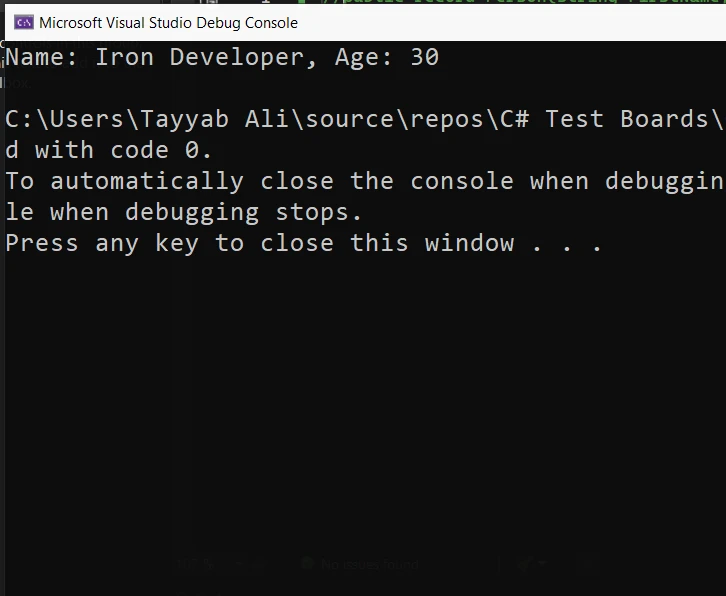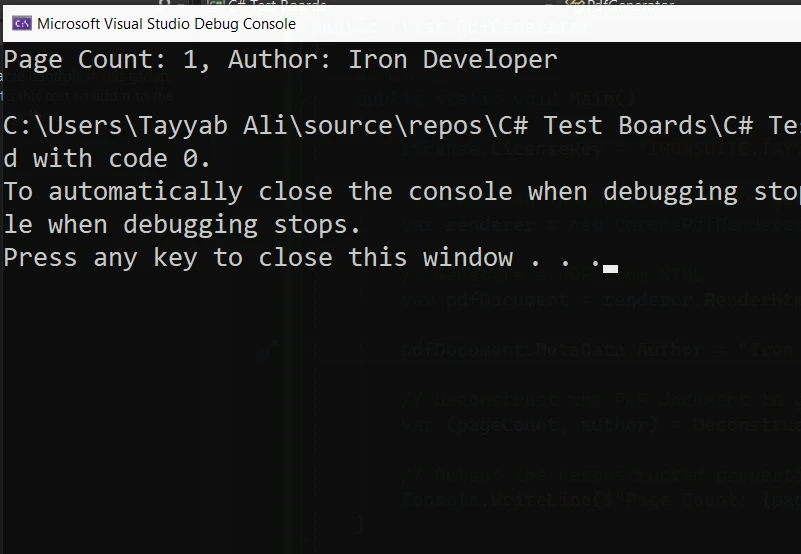Test in production without watermarks.
Works wherever you need it to.
Get 30 days of fully functional product.
Have it up and running in minutes.
Full access to our support engineering team during your product trial
Deconstructors in C# are methods that help you break down an object into multiple values. This is very different from destructors, which are used to clean up resources before an object is garbage collected. A deconstructor allows you to extract values from an object with ease. Understanding deconstructors is very helpful for developers who work with complex data structures and need to access parts of an object quickly and cleanly. We'll explore what a deconstructor is and its usage with the IronPDF library.
A deconstructor in C# is defined within a class, and it specifically deals with breaking the object into parts. You define a deconstructor using the public void Deconstruct method. This method uses parameters to return the components of the object. Each parameter corresponds to a piece of data within the object. It's crucial to distinguish this from destructors, which are usually defined using protected override void Finalize.
Consider a simple Person class. This class can have a deconstructor that splits the object into name and age. Here’s how you can define it:
public class Person
{
public string Name { get; set; }
public int Age { get; set; }
public void Deconstruct(out string name, out int age)
{
name = this.Name;
age = this.Age;
}
}public class Person
{
public string Name { get; set; }
public int Age { get; set; }
public void Deconstruct(out string name, out int age)
{
name = this.Name;
age = this.Age;
}
}Public Class Person
Public Property Name() As String
Public Property Age() As Integer
Public Sub Deconstruct(<System.Runtime.InteropServices.Out()> ByRef name As String, <System.Runtime.InteropServices.Out()> ByRef age As Integer)
name = Me.Name
age = Me.Age
End Sub
End ClassIn the above example, the Person class has a Deconstruct method that outputs the Name and Age properties. This is particularly useful when you want to assign these values to variables quickly.
To use a deconstructor, you typically employ tuple deconstruction syntax. Here’s how you can use the deconstructor for the Person class:
public static void Main()
{
Person person = new Person { Name = "Iron Developer", Age = 30 };
(string name, int age) = person;
Console.WriteLine($"Name: {name}, Age: {age}");
}public static void Main()
{
Person person = new Person { Name = "Iron Developer", Age = 30 };
(string name, int age) = person;
Console.WriteLine($"Name: {name}, Age: {age}");
}Public Shared Sub Main()
Dim person As New Person With {
.Name = "Iron Developer",
.Age = 30
}
'INSTANT VB TODO TASK: VB has no equivalent to C# deconstruction declarations:
(String name, Integer age) = person
Console.WriteLine($"Name: {name}, Age: {age}")
End SubThe public static void Main method in this instance creates a new Person, then uses the deconstructor to extract the Name and Age. This method is implicitly called when the program runs, simplifying the extraction of data from objects.

Tuple deconstruction is a convenient way to extract values from a tuple and assign them to individual variables. This feature allows you to break down a tuple into its constituent parts in a single statement, making your code cleaner and more readable.
Here's how you can deconstruct a tuple in C#:
using System;
public class Program
{
public static void Main()
{
// Create an instance of the Book class
var book = new Book
{
Title = "C# Programming",
Author = "Jon Skeet",
Pages = 300
};
// Deconstruct the book object to get properties directly
var (title, author, pages) = DeconstructBook(book);
// Output the deconstructed properties
Console.WriteLine($"Title: {title}, Author: {author}, Pages: {pages}");
}
// Example of a deconstructor for a Book class
private static (string title, string author, int pages) DeconstructBook(Book book)
{
return (book.Title, book.Author, book.Pages);
}
}
public class Book
{
public string Title { get; set; }
public string Author { get; set; }
public int Pages { get; set; }
}using System;
public class Program
{
public static void Main()
{
// Create an instance of the Book class
var book = new Book
{
Title = "C# Programming",
Author = "Jon Skeet",
Pages = 300
};
// Deconstruct the book object to get properties directly
var (title, author, pages) = DeconstructBook(book);
// Output the deconstructed properties
Console.WriteLine($"Title: {title}, Author: {author}, Pages: {pages}");
}
// Example of a deconstructor for a Book class
private static (string title, string author, int pages) DeconstructBook(Book book)
{
return (book.Title, book.Author, book.Pages);
}
}
public class Book
{
public string Title { get; set; }
public string Author { get; set; }
public int Pages { get; set; }
}Imports System
Public Class Program
Public Shared Sub Main()
' Create an instance of the Book class
Dim book As New Book With {
.Title = "C# Programming",
.Author = "Jon Skeet",
.Pages = 300
}
' Deconstruct the book object to get properties directly
'INSTANT VB TODO TASK: VB has no equivalent to C# deconstruction declarations:
var(title, author, pages) = DeconstructBook(book)
' Output the deconstructed properties
Console.WriteLine($"Title: {title}, Author: {author}, Pages: {pages}")
End Sub
' Example of a deconstructor for a Book class
Private Shared Function DeconstructBook(ByVal book As Book) As (title As String, author As String, pages As Integer)
Return (book.Title, book.Author, book.Pages)
End Function
End Class
Public Class Book
Public Property Title() As String
Public Property Author() As String
Public Property Pages() As Integer
End ClassIn this example, the Book class contains three properties: Title, Author, and Pages. The DeconstructBook() method takes an instance of the Book class and returns a tuple containing the values of these properties. The deconstruction statement in the Main() method then assigns these values to the variables title, author, and pages, respectively. This way, you can easily access the individual values without needing to reference the Book object directly.
Deconstructors provide a way to explicitly extract information from an object. They must be called explicitly to retrieve data. This ensures that the information can be accessed directly and immediately. Deconstructors simplify the process of breaking down an object into its parts. They are especially useful for pattern matching and value extraction.
If a base class has a deconstructor, it can be extended or overridden in a derived class. This follows the inheritance chain, allowing for extension methods to be applied, which can further customize the deconstruction process. This is particularly useful when the derived class includes additional properties that need to be extracted alongside those inherited from the base class.
IronPDF is a .NET library that makes it easy to create, edit, and manage PDF files using C#. IronPDF uses a Chrome Rendering Engine for this conversion. It ensures that the PDFs look accurate and sharp. It allows developers to focus on designing their content in HTML without worrying about complex PDF generation details. IronPDF supports converting HTML directly to PDFs. It can also turn web forms, URLs, and images into PDF documents. For editing, you can add text, images, headers, and footers to your PDFs. It also lets you secure your PDFs with passwords and digital signatures.
The following code shows how you might use IronPDF in C# to generate a PDF from HTML content, and then use a deconstructor to handle the resulting PDF document for further operations like reading properties without needing multiple method calls or temporary variables. This is a basic usage pattern emphasizing the generation and deconstruction aspects:
using IronPdf;
public class PdfGenerator
{
public static void Main()
{
License.LicenseKey = "License-Key";
// Create an instance of the PDF generator
var renderer = new ChromePdfRenderer();
// Generate a PDF from HTML
var pdfDocument = renderer.RenderHtmlAsPdf("<h1>Hello, IronPDF!</h1>");
// Deconstruct the PDF document to get properties directly
var (pageCount, author) = DeconstructPdf(pdfDocument);
// Output the deconstructed properties
Console.WriteLine($"Page Count: {pageCount}, Author: {author}");
}
// Example of a deconstructor for a PdfDocument
private static (int pageCount, string author) DeconstructPdf(PdfDocument document)
{
return (document.PageCount, document.MetaData.Author);
}
}using IronPdf;
public class PdfGenerator
{
public static void Main()
{
License.LicenseKey = "License-Key";
// Create an instance of the PDF generator
var renderer = new ChromePdfRenderer();
// Generate a PDF from HTML
var pdfDocument = renderer.RenderHtmlAsPdf("<h1>Hello, IronPDF!</h1>");
// Deconstruct the PDF document to get properties directly
var (pageCount, author) = DeconstructPdf(pdfDocument);
// Output the deconstructed properties
Console.WriteLine($"Page Count: {pageCount}, Author: {author}");
}
// Example of a deconstructor for a PdfDocument
private static (int pageCount, string author) DeconstructPdf(PdfDocument document)
{
return (document.PageCount, document.MetaData.Author);
}
}Imports IronPdf
Public Class PdfGenerator
Public Shared Sub Main()
License.LicenseKey = "License-Key"
' Create an instance of the PDF generator
Dim renderer = New ChromePdfRenderer()
' Generate a PDF from HTML
Dim pdfDocument = renderer.RenderHtmlAsPdf("<h1>Hello, IronPDF!</h1>")
' Deconstruct the PDF document to get properties directly
'INSTANT VB TODO TASK: VB has no equivalent to C# deconstruction declarations:
var(pageCount, author) = DeconstructPdf(pdfDocument)
' Output the deconstructed properties
Console.WriteLine($"Page Count: {pageCount}, Author: {author}")
End Sub
' Example of a deconstructor for a PdfDocument
Private Shared Function DeconstructPdf(ByVal document As PdfDocument) As (pageCount As Integer, author As String)
Return (document.PageCount, document.MetaData.Author)
End Function
End Class
This C# example abstracts the process of fetching properties from a PDF document, illustrating how you can use a deconstructor in practical scenarios to simplify your code structure and improve readability. Remember, IronPDF does not inherently support deconstructors; this is just a custom implementation for demonstration purposes.
In summary, deconstructors in C# are powerful tools that let developers efficiently handle and manipulate data within objects. By understanding how to implement and use deconstructors, you can manage complex data more effectively, ensuring that all components of an object are accessible when needed. Whether you're dealing with simple or complex objects, mastering deconstructors will greatly enhance your coding effectiveness and precision in managing data structures.
Explore IronPDF Pricing and Licensing Options starting at $749.